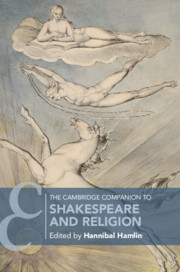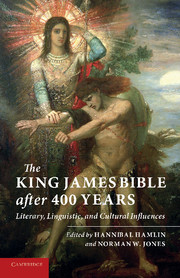35 results
Unsettled Toleration: Religious Difference on the Shakespearean Stage. Brian Walsh. Oxford: Oxford University Press, 2016. 222 pp. $99.
-
- Journal:
- Renaissance Quarterly / Volume 74 / Issue 4 / Winter 2021
- Published online by Cambridge University Press:
- 31 December 2021, pp. 1419-1421
- Print publication:
- Winter 2021
-
- Article
- Export citation
3 - The Renaissance Bible
-
-
- Book:
- The Cambridge Companion to Shakespeare and Religion
- Published online:
- 12 April 2019
- Print publication:
- 28 March 2019, pp 34-51
-
- Chapter
- Export citation
Copyright page
-
- Book:
- The Cambridge Companion to Shakespeare and Religion
- Published online:
- 12 April 2019
- Print publication:
- 28 March 2019, pp iv-iv
-
- Chapter
- Export citation
Contributors
-
- Book:
- The Cambridge Companion to Shakespeare and Religion
- Published online:
- 12 April 2019
- Print publication:
- 28 March 2019, pp ix-x
-
- Chapter
- Export citation
A Note on the Texts
-
- Book:
- The Cambridge Companion to Shakespeare and Religion
- Published online:
- 12 April 2019
- Print publication:
- 28 March 2019, pp xv-xvi
-
- Chapter
- Export citation
Figures
-
- Book:
- The Cambridge Companion to Shakespeare and Religion
- Published online:
- 12 April 2019
- Print publication:
- 28 March 2019, pp vii-viii
-
- Chapter
- Export citation
Contents
-
- Book:
- The Cambridge Companion to Shakespeare and Religion
- Published online:
- 12 April 2019
- Print publication:
- 28 March 2019, pp v-vi
-
- Chapter
- Export citation
Index
-
- Book:
- The Cambridge Companion to Shakespeare and Religion
- Published online:
- 12 April 2019
- Print publication:
- 28 March 2019, pp 301-306
-
- Chapter
- Export citation
Preface
-
- Book:
- The Cambridge Companion to Shakespeare and Religion
- Published online:
- 12 April 2019
- Print publication:
- 28 March 2019, pp xi-xiv
-
- Chapter
- Export citation
Abbreviations
-
- Book:
- The Cambridge Companion to Shakespeare and Religion
- Published online:
- 12 April 2019
- Print publication:
- 28 March 2019, pp xvii-xviii
-
- Chapter
- Export citation
Guide to Further Reading
-
- Book:
- The Cambridge Companion to Shakespeare and Religion
- Published online:
- 12 April 2019
- Print publication:
- 28 March 2019, pp 293-300
-
- Chapter
- Export citation

The Cambridge Companion to Shakespeare and Religion
-
- Published online:
- 12 April 2019
- Print publication:
- 28 March 2019
Chapter 8 - The Acts of Pericles: Shakespeare’s Biblical Romance
- from III - Interplay:
-
-
- Book:
- The Bible on the Shakespearean Stage
- Published online:
- 17 April 2018
- Print publication:
- 26 April 2018, pp 140-155
-
- Chapter
- Export citation
Beth Quitslund. The Reformation in Rhyme: Sternhold, Hopkins and the English Metrical Psalter, 1547–1603. St. Andrews Studies in Reformation History. Aldershot: Ashgate Publishing Limited, 2008. Reprint. x + 322 pp. index. append. tbls. bibl. $114.95. ISBN: 978–0–7546–6326–3.
-
- Journal:
- Renaissance Quarterly / Volume 64 / Issue 1 / Spring 2011
- Published online by Cambridge University Press:
- 20 November 2018, pp. 316-318
- Print publication:
- Spring 2011
-
- Article
- Export citation
Part I - The Language of the King James Bible
-
- Book:
- The King James Bible after Four Hundred Years
- Published online:
- 05 May 2014
- Print publication:
- 02 December 2010, pp 25-26
-
- Chapter
- Export citation
Contents
-
- Book:
- The King James Bible after Four Hundred Years
- Published online:
- 05 May 2014
- Print publication:
- 02 December 2010, pp v-vi
-
- Chapter
- Export citation
List of Illustrations
-
- Book:
- The King James Bible after Four Hundred Years
- Published online:
- 05 May 2014
- Print publication:
- 02 December 2010, pp viii-viii
-
- Chapter
- Export citation

The King James Bible after Four Hundred Years
- Literary, Linguistic, and Cultural Influences
-
- Published online:
- 05 May 2014
- Print publication:
- 02 December 2010
General index
-
- Book:
- The King James Bible after Four Hundred Years
- Published online:
- 05 May 2014
- Print publication:
- 02 December 2010, pp 359-364
-
- Chapter
- Export citation
Frontmatter
-
- Book:
- The King James Bible after Four Hundred Years
- Published online:
- 05 May 2014
- Print publication:
- 02 December 2010, pp i-iv
-
- Chapter
- Export citation



